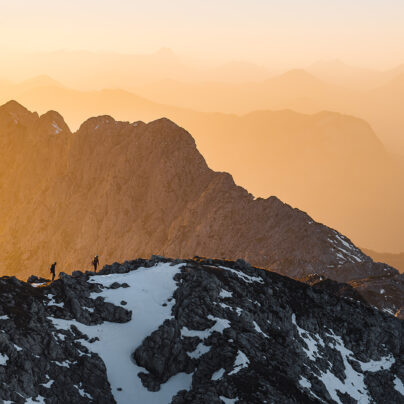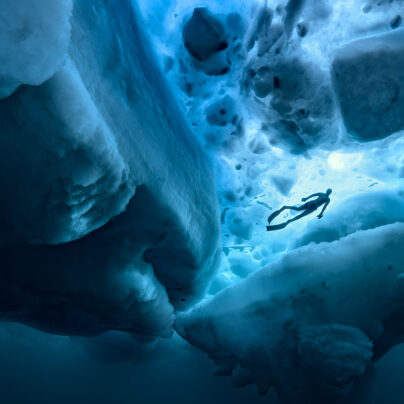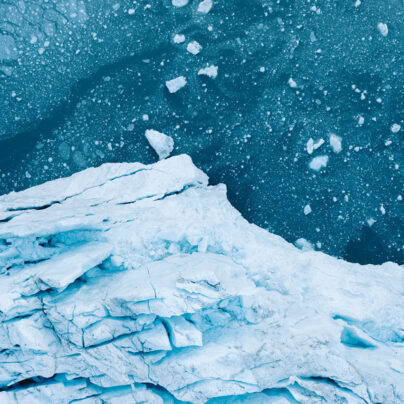Land of Horses
A Stumble at the Flooded Naryn River
Written by Ashley Parsons // Photography by Quentin Boehm
Tian staggered, fumbling on his knees, unable to catch his footing as he tried to follow me up the steep bluff. Confused and panicking, the heavily laden horse dropped back down to the narrow outcropping where my partner Quentin was standing with our other two stallions, Chaï and Fidel, counting on me to lead them forward. Waiting for me to find a safe way off the side of the cliff.
The rush of the flooded Naryn River, its angry waters churning 100m below, meant that I had to shout to Quentin: ‘I don’t know what to do.’ He didn’t know either. I had no time to make a decision. No time to say: ‘Turn your horse around, go back to a safe part of the trail.’
I could single out each noise and image from the tumult that followed. Tian squealed, backing up towards Chaï, ears pinned flat against his head, warning Chaï to move. Chaï tried to shuffle away as Tian gave a warning kick. Quentin shouted, ‘Move him forward, he’s pushing Chaï!’ Fidel released a trumpeting whinny, mouth wide open, warning us. A log cracked and rocks began to fall. Quentin, pressed against the cliff, his free arm pushing Chaï, tried to hold him up. ‘Come on, come on,’ I tried to coo to Tian in a shaking voice. Quentin let out a bellow, drawn out, and dripping in fear, ‘No!’ Then the log gave way with a swoosh. Rocks and shale screeched. And Chaï disappeared over the cliff’s edge.
***
Kyrgyzstan is the land of horses, of open steppe and sky, of the celestial Tian Shan mountains. Quentin and I had long shared a dream of an adventure there. Galloping across the land. Stopping in yurts for a cup of tea or kumis (fermented mare’s milk). Sharing the adventure with our horses. For more than a year we’d prepared for the trek from afar, filling boxes up with gear. A 1,600km itinerary took shape using maps of national parks, satellite images, out-of-date Soviet maps, and local advice. In March 2021 we arrived in the capital, made local contacts, took Kyrgyz language lessons, and prepared to live our fantasy. And, until the day in mid-April when we brought three horses home with us in a truck from the Uzgen livestock market, the reality had matched up with our dreams. From there the two became different entities altogether.
We found ourselves the owners of three Kyrgyz stallions. Fidel, the confident and sometimes arrogant leader, immediately took to Quentin. I was the only one willing to handle Tian. His bright chestnut coat matched his fiery character, which changed as fast as the weather. The two testosterone-drunk studs took up roles as mortal enemies. A little bay stallion whom we named Chaï carried ours bags without complaint, happy to be included in the adventure. He often acted as peacekeeper between Tian and Fidel.
Endurance and trust is like a muscle; the dry hills outside of Tash Kumyr stretched ours past their comfort-zones. For a country full of roaming livestock, the region was eerily empty. Dry gullies with nearly no trail demanded time and focus to descend safely. The horses were as careful as us, gaining experience in tricky terrain, placing their hooves exactly where our boots had just been. We inched forward, only covering half our average daily distance.
Making such slow progress on the map presented a real danger. For more than 16 hours we found no source of water, for us or the horses. Going to sleep with dry mouths, we treated the half-litre bottle we had left for the morning with reverence. At noon the next day, we heard the rush of water, and found a full pond of fresh, cool water. A farmer had pierced an inter-village irrigation pipe and was siphoning off the precious resource. The horses splashed greedily in the water, gulping it down, just like us.



By late July, the bonds that held our herd together felt solid. It had taken weeks of patience, consistency, and understanding to build this trust and cohesion in our team. Horses, like humans, thrive with routine. By the time the sunup-to-sundown schedule of our days was understood by all five of us, we could bloom and relax in our own ways. Each morning, in the cool minutes before dawn, Quentin unzipped the tent to a trio of whinnies. When we emerged from the tent the horses felt that their watch duty had ended. By the time the first rays of sunlight hit their backs, they’d usually all plop down to sunbathe while we packed the tent.
As a herd, we’d faced downpours, snowstorms, and hailstorms. We’d crossed frozen rivers and snowfields and gone without water. Tricky terrain was our everyday. In the 1,000km leading up to the Naryn River, Quentin and I were the beta testers for trail safety, sliding down cliffs, falling into sticky chasms, disappearing into dry ravines hidden by tall grass, clambering over walls of rock. We didn’t have a death wish; we did it to check if the trail was safe enough for the horses to pass after us. The horses trusted us. They followed where we led them.
***
Before the cliff incident, we’d reached the shores of the Naryn River from the south, via Ulan Pass. Not a trace of snow remained at the 3,800m pass. Quentin made jokes about it being hotter in the south of France; at least there you can eat rosé and oysters, not red lentils and rice.
At the valley floor the Ulan River flowed murky blue. A few hours’ ride further, it let out into the Naryn River, huge, brown, and fast. Crossing it would be out of the question. We knew there was a bridge two days east, another two days west. The route east added six days to the leg, thanks to another chain of mountains we’d have to cross before continuing north, but our bags were light, holding food for only three more days. We decided to ride west.
Studying our Soviet-era maps, we realised we’d ridden into the Naryn Nature Reserve. Established in 1983, the reserve is one of the rare areas in Kyrgyzstan restricted from livestock farming. We relished being alone in the park. Eagles soared overhead, high above the Asian spruce trees, where we imagined Tian Shan elk quietly watching our caravan pass. Below, the ungrazed prairies seemed to boast their biodiversity. I took dozens of photos to identify later: purple Central Asian Aquilegia karelini, with their heavy bell-shaped flowers looking down; dainty blue forget-me-nots, and Tian’s favourite snack, sweet Turkestan milk thistles.
A single trail used by rangers followed the riverbank. We followed it up and down cliffs, through forests, and over outcrops, dipping down only to cross lush meadows. Sometimes it split into two paths, but it was always evident which was the primary trail. We didn’t have to think about navigation all morning. After a slow lunch in the sun, we resaddled the horses and moved on. The path narrowed through the trees. I descended to lead the way on foot. Without realising it, we found ourselves in a dangerous position. The one that led to Chaï slipping over the cliff.



Time sped back up. I had no breath.
‘It’s OK!’ I repeated.
Quentin shouted, ‘It’s not OK!’
‘We’ll get him back! I don’t know what to do!’
I saw Chaï 15m below, perched diagonally in the crumbling shale on the edge of the cliff. His face staring up at us seemed tight and nervous, but he was upright, looking to us for help. I took a breath and called to Quentin, ‘Take Fidel back, tie him to a tree. Then we’ll get Chaï.’
I climbed up the cliff to give Tian space to pivot. He turned around on his own and followed Quentin back somewhere safe. Then I heard the crash of falling rocks as Chaï struggled to climb back up alone. ‘Quentin, get back here!’ I shouted, my nerves shredded. Chaï was safe at the moment, but he was more likely to lose his footing if he panicked trying to rejoin the herd.
The thundering river far beneath us sounded more menacing than ever. As I looked down into the churn of brown water, the reality of what it would mean for Chaï to fall down there finally flashed through my head. Even if he didn’t hurt himself on the way down, a fall into the water would stun him. Even if he landed on all four feet, the water could sweep him away – and his pack would be dead weight if he lost his balance in the water. There was no scenario I could visualise that would allow him to roll himself upright and swim to a bank.
I scouted from above. Grasping at the branches bristling with green pine needles hanging over the edge of the trail, Quentin wiggled down the cliff. He whistled to Chaï. The pony’s ears perked up, and he began moving our way.
‘Wait, wait, wait!’ Quentin cried as Chaï bounded past him, scrambling up to the path through some broken pine trunks and over the rocks. He trotted over to where Tian was standing, tied. I crouched down and helped Quentin back up. For an instant we locked eyes and shared our fear. He whispered, ‘We got so lucky.’
I exhaled. We returned to the meadow where we’d had lunch. My hands trembled as I ran them all over Chaï, checking for injuries. He was unscathed, and mentally didn’t seem that shaken up. But a sick dread filled my limbs. We’d almost lost him – and all because I hadn’t scouted out the trail well enough. Should-haves began playing through my brain.
Though Quentin and I were a team, I was the one who had the final say on all things related to the horses. Ask any of the locals who often invited us to tea and they would tell you my brand of horse care bordered on neurotic. But how could I enjoy a meal if our horses had no grass to graze on? How could I sleep at night if our horses weren’t comfortable? How could I ask our horses to do anything I wouldn’t do myself? The horses had never asked to go on this adventure. They came with us because we asked them to. They trusted us, and I’d put them all in a life-threatening situation.


The wildflowers didn’t seem so reassuring any more. Instead, they reminded me that we were alone out here, responsible for ourselves and our horses. I wandered off to cry and to scout the way forward on foot. It was evident where we’d gone wrong: we’d missed the turn and followed the wrong path after lunch. The real trail climbed higher than the path we’d fallen from. And it was safe, wide, easy to navigate.
I spent the afternoon trying to banish the guilt and feeling of failure from my body. Quentin must have been doing the same, because we barely talked. Cresting a hill, taking in the sight of a cabin, I dropped my reins and stood up in my stirrups, twisting back to grin at Quentin. Alpine huts are as rare in Kyrgyzstan as wildlife reserves. There was even a hitching post. A little trick of fate had planted the cabin there for the rangers, but we knew that today it was there for us – all five of us needed a bone thrown from the universe. Untacking the horses, we let them loose to graze.
A narrow trail led to a stream beside the cabin. A natural pool fed by a small waterfall served as a bathtub. I lined up my little bar of olive oil soap, the rough glove I used to scrub off all the grit from the day, and my towel. Then, without making an effort to hold my breath, I dropped under the freezing water. I could put my feet down if I wanted, but I didn’t. Hanging suspended in the pool, I felt the force of the water as it hit the edge of the pool and flowed over me, then raced down to the Naryn River. When I came up for air, I burst into tears again, imagining that this same water could have thrown Chaï against rocks, and how the weight of his pack and the pounding current were stronger than he could ever be.
As I returned from my bath, the three horses lifted their heads and looked at me. Chaï intercepted my path to the cabin to check if I had any snacks in my hands. I buried my face in his mane and inhaled; the sweet smell of horse, dust, sweat, and leather filled my nostrils. He stood still and let me cuddle him for a moment. Horses can teach humans a lot. They learn, remember, and make decisions weighed with care. Mostly, though, they live in the present moment, taking in information and reacting to it.
Chaï wasn’t dwelling on what happened. He wasn’t blaming Tian, or me, or Quentin, or Fidel for the fall. He was looking for an apple or a scrap of bread. Quentin left the cabin doorway to join us. He gave Chaï a pat and a scratch on the hindquarters. The three of us stood there, just being. Gratitude and trust flowed through me. The accident was a sharp reminder to be vigilant on the trail, but it didn’t mean we weren’t good enough for our horses. It didn’t negate the present reality of sharing an incredible journey with them – over mountains and steppe and beneath the sky. The next morning we rode on with more prudence – and with more faith in our team than the day before. And I have my herd to thank for it.
First published in Sidetracked Volume 23
En Selle is a series of documented journeys capturing simple moments and stories of a remote minimalist lifestyle on bicycle and horseback.
Website: https://www.enselle.voyage/
Instagram: @enselle.voyage



